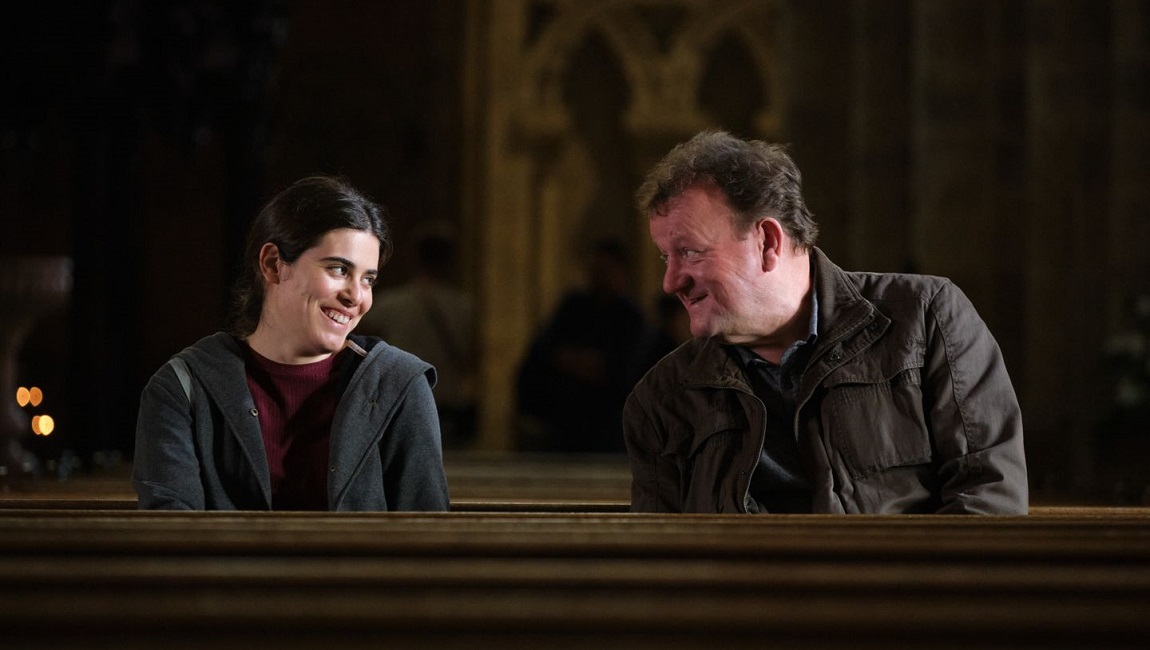Prior to the premiere of The Old Oak at Cannes back in May, Ken Loach indicated that this would be his last feature film. Granted, Loach has made that claim before, and he nevertheless feels compelled to keep working. But there would be something rather fitting, if unfortunate, if Loach called it a day following The Old Oak. A once-defiant filmmaker steeped in the British Socialist traditions of William Morris, Raymond Williams, Tony Benn, and Dennis Skinner, Loach now feels largely defeated by a country — and a global system — that has become far worse than anything he might’ve imagined. As cruel and deleterious as Thatcherism has been for the U.K. and the Commonwealth at large, it looks nearly benign compared with the rise of outright fascism. That, of course, has a long British tradition too, and in recent years the British commentariat has been reviving the ghosts of paleo-racists like Oswald Moseley and Enoch Powell, suggesting that maybe these hatemongers have a point.
Set in the economically depressed county of Durham, The Old Oak centers on T.J. (Dave Turner), the middle-aged owner of the titular pub. A once thriving community hub, The Old Oak is now a broken-down dive barely kept afloat by a small collection of old-timers. The pub’s back room, unusable and fallen into disrepair, is hung with photographs documenting the union activism of decades past, the pride of locally-based organized labor that was destroyed by Thatcher’s notoriously ruthless response to the mid-80s miners’ strike. T.J. has affection for his mates, but he is clearly exhausted, and we learn that only two years ago he attempted suicide.
But T.J.’s community spirit is revived by the arrival of Syrian refugees who, over the protests of a host of angry poor white people, are being housed in the neighborhood. After a young thug attacks a young woman named Yara (Ebla Mari), destroying her camera, T.J. befriends her, and in meeting her family, his most humanistic tendencies are confirmed. They are kind, industrious, but wholly ordinary people responding to an oppressive regime, and they want to become part of the larger community.
As is often the case with Loach’s collaborations with screenwriter Paul Laverty, The Old Oak simplifies matters in the name of educational agit-prop. The regulars at the pub resent the presence of the Syrians, reflexively blaming immigrants for their own sad plight. Thatcherism decimated this place, but it is much easier to fixate on the strangers right in front of you. Chatter in the pub about “giving them a chance” vs. “sending them back where they came from” are rote and predictable, and while one could certainly make the argument that racism itself is also rote and predictable, there’s no denying that The Old Oak is direct to the point of being formulaic. From the opening scene, with T.J. trying and failing to fix the Old Oak’s outdoor sign, to the fate of his little dog Marra, Loach’s film offers few surprises.
However, what The Old Oak does offer is a clear-eyed look at disillusionment. T.J. is an old working-class leftist, with collectivist values instilled in him by his coal miner father. But when he and Yara work to improve the sorry state of their village, they are met with ignorance and active sabotage. Near the end of the film, T.J. breaks down in tears, leaving a meeting of organizers by announcing, “I’m done.” Loach and Laverty provide a somewhat positive conclusion, in which the locals accept the Syrians following the death of a family member. Class solidarity is abstract, it seems, but mourning the dead is a palpably universal experience. But in T.J.’s struggle to combat the hatred he sees welling up in his peers, it’s difficult not to see Loach engaging in a rare instance of self-portraiture. He may eventually pull a Samuel Beckett — “I can’t go on, I’ll go on” — but it would be hard to blame the 87-year-old stalwart if he were ready to call it a day. The Old Oak suggests that, far from damaging the British nation, the new immigrant communities offer new blood for the struggle. This, and this alone, seems to give Loach a modicum of hope.
DIRECTOR: Ken Loach; CAST: Dave Turner, Ebla Mari, Claire Rodgerson, Trevor Fox; DISTRIBUTOR: Zeitgeist Films; IN THEATERS: April 5; RUNTIME: 1 hr. 53 min.
Originally published as part of Locarno Film Festival 2023 — Dispatch 2.







